Corporate Social Responsibility: An Analysis of Tesco's CSR Policies
VerifiedAdded on 2023/01/13
|8
|2719
|79
Report
AI Summary
This report provides a comprehensive analysis of Corporate Social Responsibility (CSR) with a specific focus on Tesco Private Limited, a major player in the retailing industry. It begins by defining CSR and evaluating its role in modern business organizations, emphasizing the importance of ethical practices, stakeholder engagement, and sustainable business strategies. The report then examines Tesco's CSR governance and reporting policies, particularly in relation to corporation tax and investment decisions. It highlights the benefits of CSR, such as improved brand image and employee engagement, while also acknowledging the challenges, including competitive pressures and the costs of implementation. The report emphasizes the need for businesses to integrate CSR into their core operations and decision-making processes, including tax planning and investment strategies. It concludes by stressing the importance of ethical considerations and aligning business purposes with CSR principles to enhance brand reputation and attract investors and employees. The analysis covers various aspects of CSR, including environmental and social initiatives, and their impact on business outcomes.
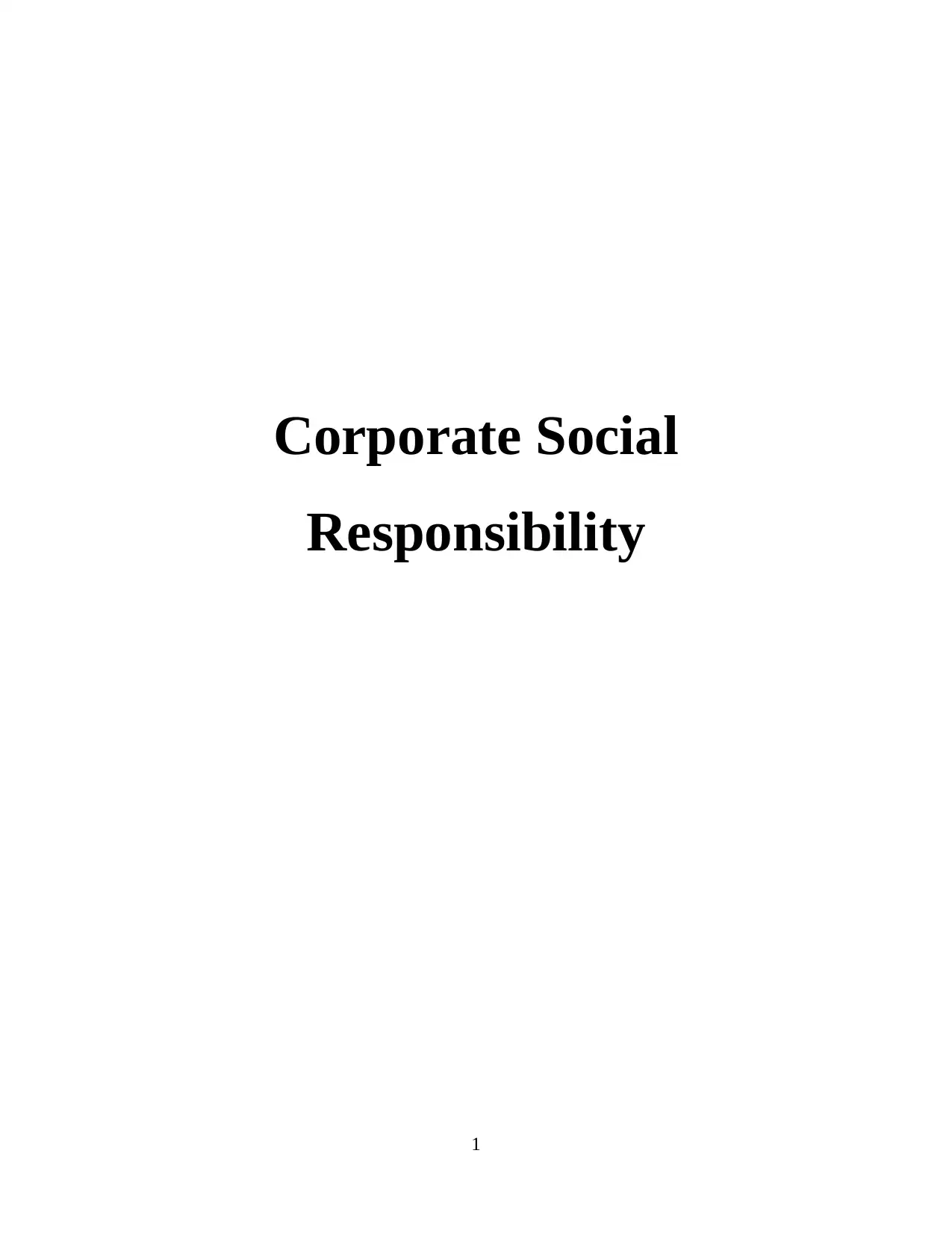
Corporate Social
Responsibility
1
Responsibility
1
Paraphrase This Document
Need a fresh take? Get an instant paraphrase of this document with our AI Paraphraser
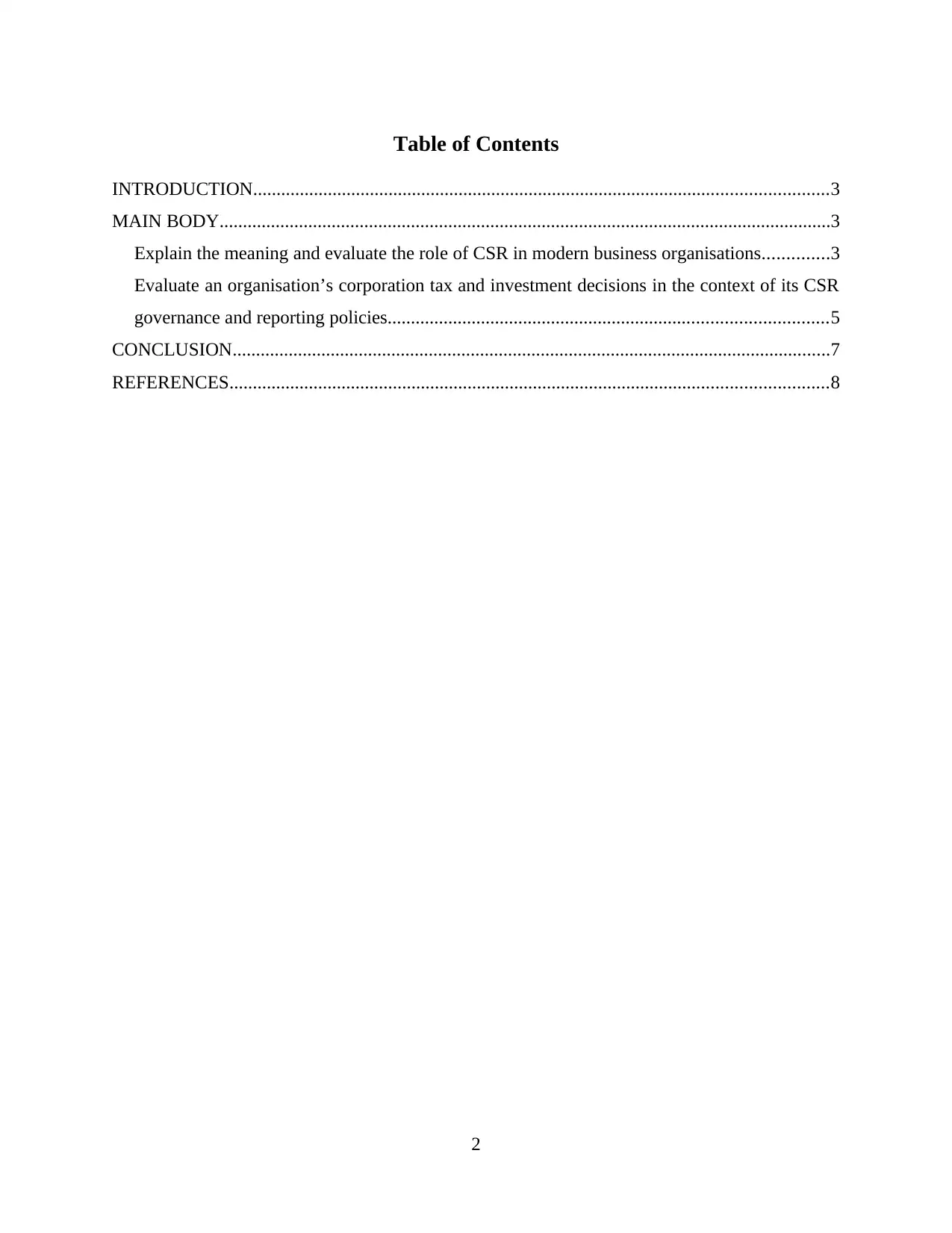
Table of Contents
INTRODUCTION...........................................................................................................................3
MAIN BODY...................................................................................................................................3
Explain the meaning and evaluate the role of CSR in modern business organisations..............3
Evaluate an organisation’s corporation tax and investment decisions in the context of its CSR
governance and reporting policies..............................................................................................5
CONCLUSION................................................................................................................................7
REFERENCES................................................................................................................................8
2
INTRODUCTION...........................................................................................................................3
MAIN BODY...................................................................................................................................3
Explain the meaning and evaluate the role of CSR in modern business organisations..............3
Evaluate an organisation’s corporation tax and investment decisions in the context of its CSR
governance and reporting policies..............................................................................................5
CONCLUSION................................................................................................................................7
REFERENCES................................................................................................................................8
2
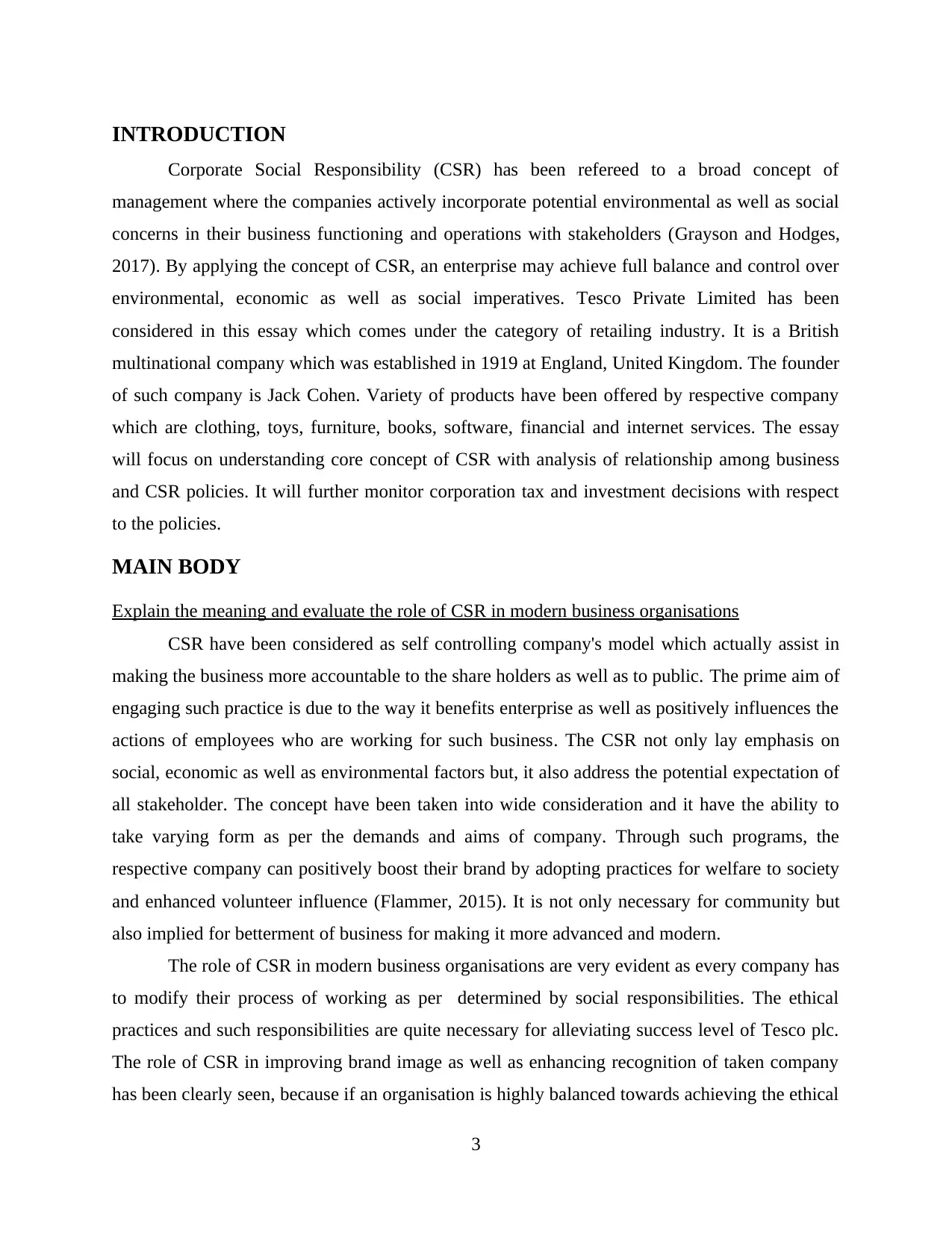
INTRODUCTION
Corporate Social Responsibility (CSR) has been refereed to a broad concept of
management where the companies actively incorporate potential environmental as well as social
concerns in their business functioning and operations with stakeholders (Grayson and Hodges,
2017). By applying the concept of CSR, an enterprise may achieve full balance and control over
environmental, economic as well as social imperatives. Tesco Private Limited has been
considered in this essay which comes under the category of retailing industry. It is a British
multinational company which was established in 1919 at England, United Kingdom. The founder
of such company is Jack Cohen. Variety of products have been offered by respective company
which are clothing, toys, furniture, books, software, financial and internet services. The essay
will focus on understanding core concept of CSR with analysis of relationship among business
and CSR policies. It will further monitor corporation tax and investment decisions with respect
to the policies.
MAIN BODY
Explain the meaning and evaluate the role of CSR in modern business organisations
CSR have been considered as self controlling company's model which actually assist in
making the business more accountable to the share holders as well as to public. The prime aim of
engaging such practice is due to the way it benefits enterprise as well as positively influences the
actions of employees who are working for such business. The CSR not only lay emphasis on
social, economic as well as environmental factors but, it also address the potential expectation of
all stakeholder. The concept have been taken into wide consideration and it have the ability to
take varying form as per the demands and aims of company. Through such programs, the
respective company can positively boost their brand by adopting practices for welfare to society
and enhanced volunteer influence (Flammer, 2015). It is not only necessary for community but
also implied for betterment of business for making it more advanced and modern.
The role of CSR in modern business organisations are very evident as every company has
to modify their process of working as per determined by social responsibilities. The ethical
practices and such responsibilities are quite necessary for alleviating success level of Tesco plc.
The role of CSR in improving brand image as well as enhancing recognition of taken company
has been clearly seen, because if an organisation is highly balanced towards achieving the ethical
3
Corporate Social Responsibility (CSR) has been refereed to a broad concept of
management where the companies actively incorporate potential environmental as well as social
concerns in their business functioning and operations with stakeholders (Grayson and Hodges,
2017). By applying the concept of CSR, an enterprise may achieve full balance and control over
environmental, economic as well as social imperatives. Tesco Private Limited has been
considered in this essay which comes under the category of retailing industry. It is a British
multinational company which was established in 1919 at England, United Kingdom. The founder
of such company is Jack Cohen. Variety of products have been offered by respective company
which are clothing, toys, furniture, books, software, financial and internet services. The essay
will focus on understanding core concept of CSR with analysis of relationship among business
and CSR policies. It will further monitor corporation tax and investment decisions with respect
to the policies.
MAIN BODY
Explain the meaning and evaluate the role of CSR in modern business organisations
CSR have been considered as self controlling company's model which actually assist in
making the business more accountable to the share holders as well as to public. The prime aim of
engaging such practice is due to the way it benefits enterprise as well as positively influences the
actions of employees who are working for such business. The CSR not only lay emphasis on
social, economic as well as environmental factors but, it also address the potential expectation of
all stakeholder. The concept have been taken into wide consideration and it have the ability to
take varying form as per the demands and aims of company. Through such programs, the
respective company can positively boost their brand by adopting practices for welfare to society
and enhanced volunteer influence (Flammer, 2015). It is not only necessary for community but
also implied for betterment of business for making it more advanced and modern.
The role of CSR in modern business organisations are very evident as every company has
to modify their process of working as per determined by social responsibilities. The ethical
practices and such responsibilities are quite necessary for alleviating success level of Tesco plc.
The role of CSR in improving brand image as well as enhancing recognition of taken company
has been clearly seen, because if an organisation is highly balanced towards achieving the ethical
3
⊘ This is a preview!⊘
Do you want full access?
Subscribe today to unlock all pages.

Trusted by 1+ million students worldwide
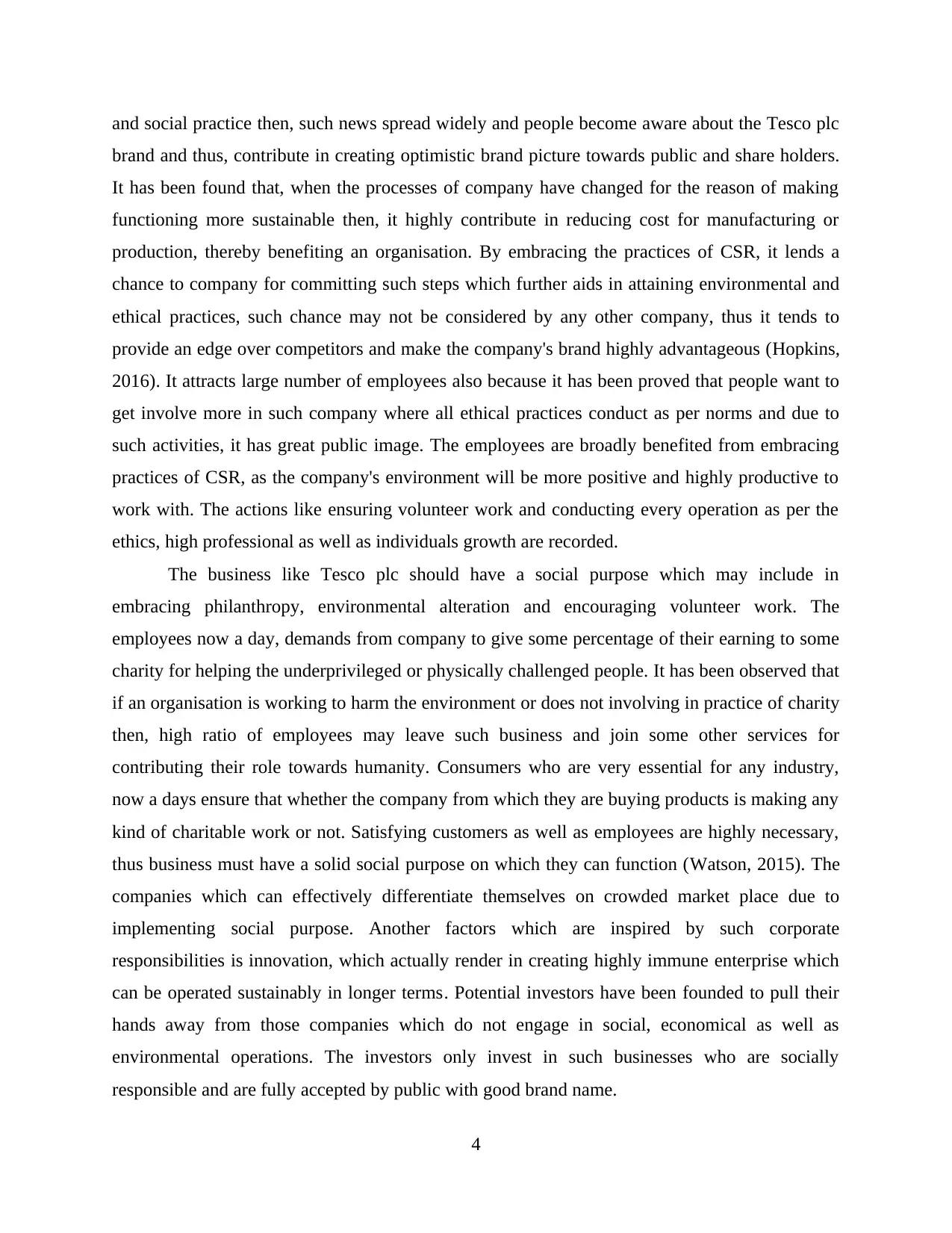
and social practice then, such news spread widely and people become aware about the Tesco plc
brand and thus, contribute in creating optimistic brand picture towards public and share holders.
It has been found that, when the processes of company have changed for the reason of making
functioning more sustainable then, it highly contribute in reducing cost for manufacturing or
production, thereby benefiting an organisation. By embracing the practices of CSR, it lends a
chance to company for committing such steps which further aids in attaining environmental and
ethical practices, such chance may not be considered by any other company, thus it tends to
provide an edge over competitors and make the company's brand highly advantageous (Hopkins,
2016). It attracts large number of employees also because it has been proved that people want to
get involve more in such company where all ethical practices conduct as per norms and due to
such activities, it has great public image. The employees are broadly benefited from embracing
practices of CSR, as the company's environment will be more positive and highly productive to
work with. The actions like ensuring volunteer work and conducting every operation as per the
ethics, high professional as well as individuals growth are recorded.
The business like Tesco plc should have a social purpose which may include in
embracing philanthropy, environmental alteration and encouraging volunteer work. The
employees now a day, demands from company to give some percentage of their earning to some
charity for helping the underprivileged or physically challenged people. It has been observed that
if an organisation is working to harm the environment or does not involving in practice of charity
then, high ratio of employees may leave such business and join some other services for
contributing their role towards humanity. Consumers who are very essential for any industry,
now a days ensure that whether the company from which they are buying products is making any
kind of charitable work or not. Satisfying customers as well as employees are highly necessary,
thus business must have a solid social purpose on which they can function (Watson, 2015). The
companies which can effectively differentiate themselves on crowded market place due to
implementing social purpose. Another factors which are inspired by such corporate
responsibilities is innovation, which actually render in creating highly immune enterprise which
can be operated sustainably in longer terms. Potential investors have been founded to pull their
hands away from those companies which do not engage in social, economical as well as
environmental operations. The investors only invest in such businesses who are socially
responsible and are fully accepted by public with good brand name.
4
brand and thus, contribute in creating optimistic brand picture towards public and share holders.
It has been found that, when the processes of company have changed for the reason of making
functioning more sustainable then, it highly contribute in reducing cost for manufacturing or
production, thereby benefiting an organisation. By embracing the practices of CSR, it lends a
chance to company for committing such steps which further aids in attaining environmental and
ethical practices, such chance may not be considered by any other company, thus it tends to
provide an edge over competitors and make the company's brand highly advantageous (Hopkins,
2016). It attracts large number of employees also because it has been proved that people want to
get involve more in such company where all ethical practices conduct as per norms and due to
such activities, it has great public image. The employees are broadly benefited from embracing
practices of CSR, as the company's environment will be more positive and highly productive to
work with. The actions like ensuring volunteer work and conducting every operation as per the
ethics, high professional as well as individuals growth are recorded.
The business like Tesco plc should have a social purpose which may include in
embracing philanthropy, environmental alteration and encouraging volunteer work. The
employees now a day, demands from company to give some percentage of their earning to some
charity for helping the underprivileged or physically challenged people. It has been observed that
if an organisation is working to harm the environment or does not involving in practice of charity
then, high ratio of employees may leave such business and join some other services for
contributing their role towards humanity. Consumers who are very essential for any industry,
now a days ensure that whether the company from which they are buying products is making any
kind of charitable work or not. Satisfying customers as well as employees are highly necessary,
thus business must have a solid social purpose on which they can function (Watson, 2015). The
companies which can effectively differentiate themselves on crowded market place due to
implementing social purpose. Another factors which are inspired by such corporate
responsibilities is innovation, which actually render in creating highly immune enterprise which
can be operated sustainably in longer terms. Potential investors have been founded to pull their
hands away from those companies which do not engage in social, economical as well as
environmental operations. The investors only invest in such businesses who are socially
responsible and are fully accepted by public with good brand name.
4
Paraphrase This Document
Need a fresh take? Get an instant paraphrase of this document with our AI Paraphraser
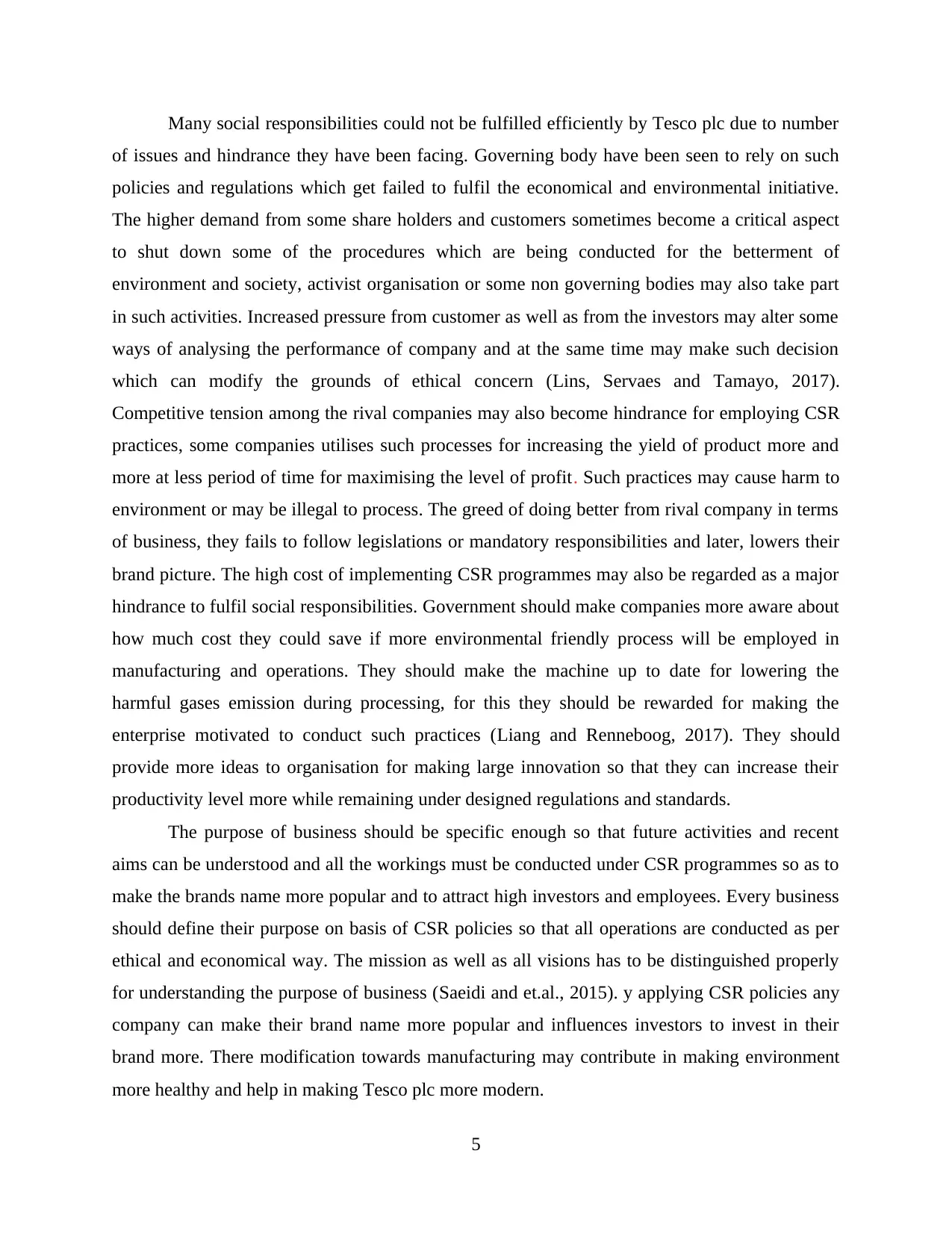
Many social responsibilities could not be fulfilled efficiently by Tesco plc due to number
of issues and hindrance they have been facing. Governing body have been seen to rely on such
policies and regulations which get failed to fulfil the economical and environmental initiative.
The higher demand from some share holders and customers sometimes become a critical aspect
to shut down some of the procedures which are being conducted for the betterment of
environment and society, activist organisation or some non governing bodies may also take part
in such activities. Increased pressure from customer as well as from the investors may alter some
ways of analysing the performance of company and at the same time may make such decision
which can modify the grounds of ethical concern (Lins, Servaes and Tamayo, 2017).
Competitive tension among the rival companies may also become hindrance for employing CSR
practices, some companies utilises such processes for increasing the yield of product more and
more at less period of time for maximising the level of profit. Such practices may cause harm to
environment or may be illegal to process. The greed of doing better from rival company in terms
of business, they fails to follow legislations or mandatory responsibilities and later, lowers their
brand picture. The high cost of implementing CSR programmes may also be regarded as a major
hindrance to fulfil social responsibilities. Government should make companies more aware about
how much cost they could save if more environmental friendly process will be employed in
manufacturing and operations. They should make the machine up to date for lowering the
harmful gases emission during processing, for this they should be rewarded for making the
enterprise motivated to conduct such practices (Liang and Renneboog, 2017). They should
provide more ideas to organisation for making large innovation so that they can increase their
productivity level more while remaining under designed regulations and standards.
The purpose of business should be specific enough so that future activities and recent
aims can be understood and all the workings must be conducted under CSR programmes so as to
make the brands name more popular and to attract high investors and employees. Every business
should define their purpose on basis of CSR policies so that all operations are conducted as per
ethical and economical way. The mission as well as all visions has to be distinguished properly
for understanding the purpose of business (Saeidi and et.al., 2015). y applying CSR policies any
company can make their brand name more popular and influences investors to invest in their
brand more. There modification towards manufacturing may contribute in making environment
more healthy and help in making Tesco plc more modern.
5
of issues and hindrance they have been facing. Governing body have been seen to rely on such
policies and regulations which get failed to fulfil the economical and environmental initiative.
The higher demand from some share holders and customers sometimes become a critical aspect
to shut down some of the procedures which are being conducted for the betterment of
environment and society, activist organisation or some non governing bodies may also take part
in such activities. Increased pressure from customer as well as from the investors may alter some
ways of analysing the performance of company and at the same time may make such decision
which can modify the grounds of ethical concern (Lins, Servaes and Tamayo, 2017).
Competitive tension among the rival companies may also become hindrance for employing CSR
practices, some companies utilises such processes for increasing the yield of product more and
more at less period of time for maximising the level of profit. Such practices may cause harm to
environment or may be illegal to process. The greed of doing better from rival company in terms
of business, they fails to follow legislations or mandatory responsibilities and later, lowers their
brand picture. The high cost of implementing CSR programmes may also be regarded as a major
hindrance to fulfil social responsibilities. Government should make companies more aware about
how much cost they could save if more environmental friendly process will be employed in
manufacturing and operations. They should make the machine up to date for lowering the
harmful gases emission during processing, for this they should be rewarded for making the
enterprise motivated to conduct such practices (Liang and Renneboog, 2017). They should
provide more ideas to organisation for making large innovation so that they can increase their
productivity level more while remaining under designed regulations and standards.
The purpose of business should be specific enough so that future activities and recent
aims can be understood and all the workings must be conducted under CSR programmes so as to
make the brands name more popular and to attract high investors and employees. Every business
should define their purpose on basis of CSR policies so that all operations are conducted as per
ethical and economical way. The mission as well as all visions has to be distinguished properly
for understanding the purpose of business (Saeidi and et.al., 2015). y applying CSR policies any
company can make their brand name more popular and influences investors to invest in their
brand more. There modification towards manufacturing may contribute in making environment
more healthy and help in making Tesco plc more modern.
5
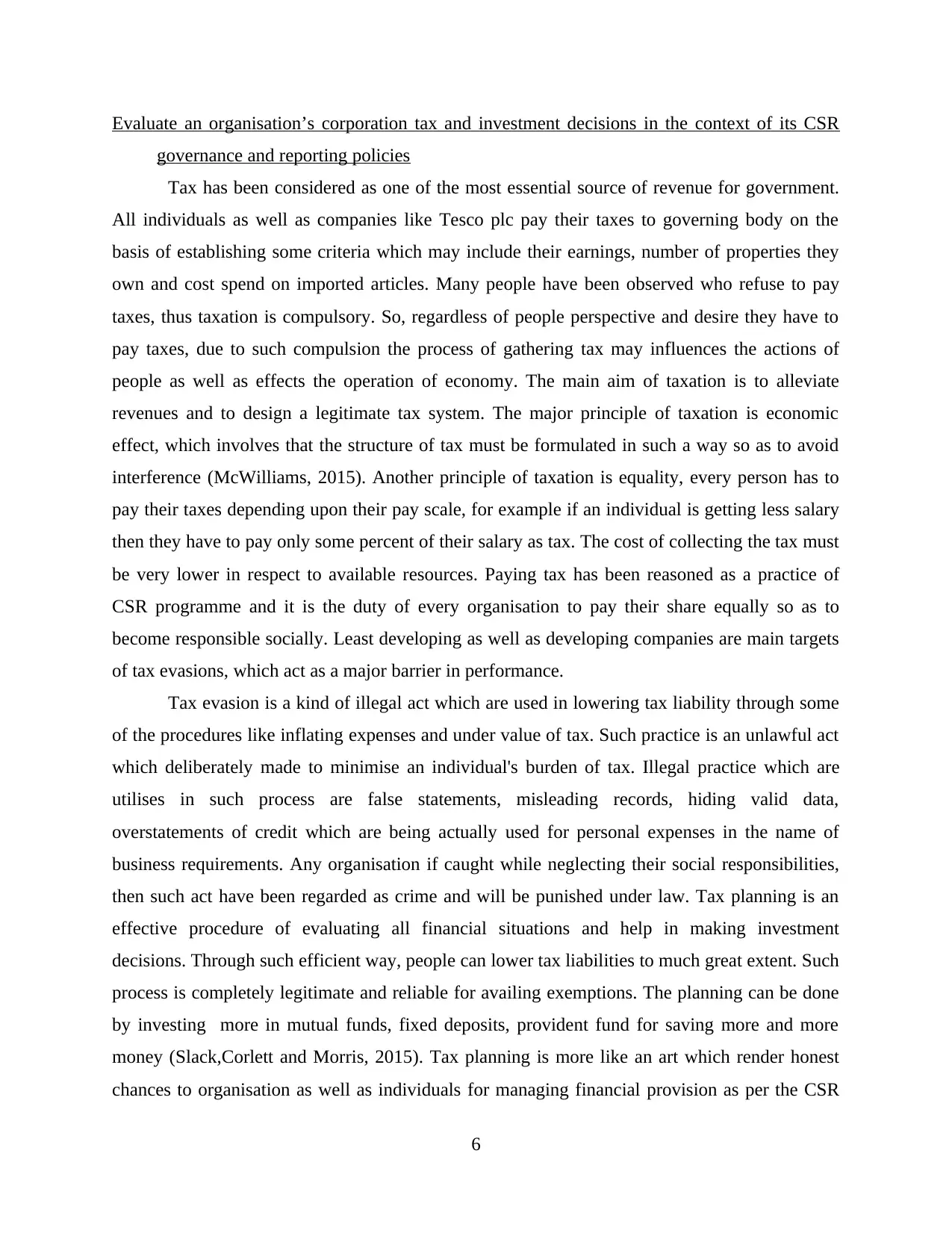
Evaluate an organisation’s corporation tax and investment decisions in the context of its CSR
governance and reporting policies
Tax has been considered as one of the most essential source of revenue for government.
All individuals as well as companies like Tesco plc pay their taxes to governing body on the
basis of establishing some criteria which may include their earnings, number of properties they
own and cost spend on imported articles. Many people have been observed who refuse to pay
taxes, thus taxation is compulsory. So, regardless of people perspective and desire they have to
pay taxes, due to such compulsion the process of gathering tax may influences the actions of
people as well as effects the operation of economy. The main aim of taxation is to alleviate
revenues and to design a legitimate tax system. The major principle of taxation is economic
effect, which involves that the structure of tax must be formulated in such a way so as to avoid
interference (McWilliams, 2015). Another principle of taxation is equality, every person has to
pay their taxes depending upon their pay scale, for example if an individual is getting less salary
then they have to pay only some percent of their salary as tax. The cost of collecting the tax must
be very lower in respect to available resources. Paying tax has been reasoned as a practice of
CSR programme and it is the duty of every organisation to pay their share equally so as to
become responsible socially. Least developing as well as developing companies are main targets
of tax evasions, which act as a major barrier in performance.
Tax evasion is a kind of illegal act which are used in lowering tax liability through some
of the procedures like inflating expenses and under value of tax. Such practice is an unlawful act
which deliberately made to minimise an individual's burden of tax. Illegal practice which are
utilises in such process are false statements, misleading records, hiding valid data,
overstatements of credit which are being actually used for personal expenses in the name of
business requirements. Any organisation if caught while neglecting their social responsibilities,
then such act have been regarded as crime and will be punished under law. Tax planning is an
effective procedure of evaluating all financial situations and help in making investment
decisions. Through such efficient way, people can lower tax liabilities to much great extent. Such
process is completely legitimate and reliable for availing exemptions. The planning can be done
by investing more in mutual funds, fixed deposits, provident fund for saving more and more
money (Slack,Corlett and Morris, 2015). Tax planning is more like an art which render honest
chances to organisation as well as individuals for managing financial provision as per the CSR
6
governance and reporting policies
Tax has been considered as one of the most essential source of revenue for government.
All individuals as well as companies like Tesco plc pay their taxes to governing body on the
basis of establishing some criteria which may include their earnings, number of properties they
own and cost spend on imported articles. Many people have been observed who refuse to pay
taxes, thus taxation is compulsory. So, regardless of people perspective and desire they have to
pay taxes, due to such compulsion the process of gathering tax may influences the actions of
people as well as effects the operation of economy. The main aim of taxation is to alleviate
revenues and to design a legitimate tax system. The major principle of taxation is economic
effect, which involves that the structure of tax must be formulated in such a way so as to avoid
interference (McWilliams, 2015). Another principle of taxation is equality, every person has to
pay their taxes depending upon their pay scale, for example if an individual is getting less salary
then they have to pay only some percent of their salary as tax. The cost of collecting the tax must
be very lower in respect to available resources. Paying tax has been reasoned as a practice of
CSR programme and it is the duty of every organisation to pay their share equally so as to
become responsible socially. Least developing as well as developing companies are main targets
of tax evasions, which act as a major barrier in performance.
Tax evasion is a kind of illegal act which are used in lowering tax liability through some
of the procedures like inflating expenses and under value of tax. Such practice is an unlawful act
which deliberately made to minimise an individual's burden of tax. Illegal practice which are
utilises in such process are false statements, misleading records, hiding valid data,
overstatements of credit which are being actually used for personal expenses in the name of
business requirements. Any organisation if caught while neglecting their social responsibilities,
then such act have been regarded as crime and will be punished under law. Tax planning is an
effective procedure of evaluating all financial situations and help in making investment
decisions. Through such efficient way, people can lower tax liabilities to much great extent. Such
process is completely legitimate and reliable for availing exemptions. The planning can be done
by investing more in mutual funds, fixed deposits, provident fund for saving more and more
money (Slack,Corlett and Morris, 2015). Tax planning is more like an art which render honest
chances to organisation as well as individuals for managing financial provision as per the CSR
6
⊘ This is a preview!⊘
Do you want full access?
Subscribe today to unlock all pages.

Trusted by 1+ million students worldwide
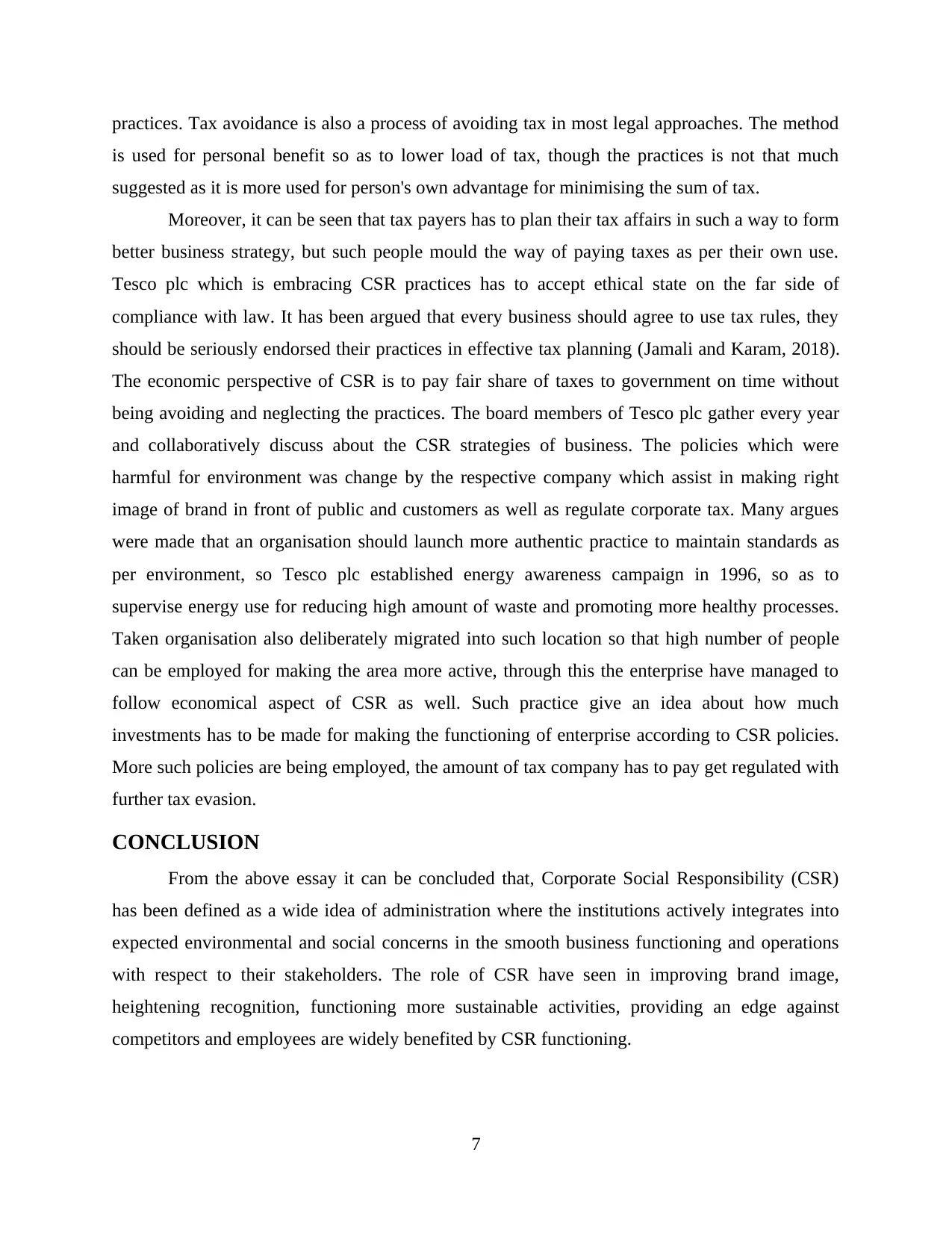
practices. Tax avoidance is also a process of avoiding tax in most legal approaches. The method
is used for personal benefit so as to lower load of tax, though the practices is not that much
suggested as it is more used for person's own advantage for minimising the sum of tax.
Moreover, it can be seen that tax payers has to plan their tax affairs in such a way to form
better business strategy, but such people mould the way of paying taxes as per their own use.
Tesco plc which is embracing CSR practices has to accept ethical state on the far side of
compliance with law. It has been argued that every business should agree to use tax rules, they
should be seriously endorsed their practices in effective tax planning (Jamali and Karam, 2018).
The economic perspective of CSR is to pay fair share of taxes to government on time without
being avoiding and neglecting the practices. The board members of Tesco plc gather every year
and collaboratively discuss about the CSR strategies of business. The policies which were
harmful for environment was change by the respective company which assist in making right
image of brand in front of public and customers as well as regulate corporate tax. Many argues
were made that an organisation should launch more authentic practice to maintain standards as
per environment, so Tesco plc established energy awareness campaign in 1996, so as to
supervise energy use for reducing high amount of waste and promoting more healthy processes.
Taken organisation also deliberately migrated into such location so that high number of people
can be employed for making the area more active, through this the enterprise have managed to
follow economical aspect of CSR as well. Such practice give an idea about how much
investments has to be made for making the functioning of enterprise according to CSR policies.
More such policies are being employed, the amount of tax company has to pay get regulated with
further tax evasion.
CONCLUSION
From the above essay it can be concluded that, Corporate Social Responsibility (CSR)
has been defined as a wide idea of administration where the institutions actively integrates into
expected environmental and social concerns in the smooth business functioning and operations
with respect to their stakeholders. The role of CSR have seen in improving brand image,
heightening recognition, functioning more sustainable activities, providing an edge against
competitors and employees are widely benefited by CSR functioning.
7
is used for personal benefit so as to lower load of tax, though the practices is not that much
suggested as it is more used for person's own advantage for minimising the sum of tax.
Moreover, it can be seen that tax payers has to plan their tax affairs in such a way to form
better business strategy, but such people mould the way of paying taxes as per their own use.
Tesco plc which is embracing CSR practices has to accept ethical state on the far side of
compliance with law. It has been argued that every business should agree to use tax rules, they
should be seriously endorsed their practices in effective tax planning (Jamali and Karam, 2018).
The economic perspective of CSR is to pay fair share of taxes to government on time without
being avoiding and neglecting the practices. The board members of Tesco plc gather every year
and collaboratively discuss about the CSR strategies of business. The policies which were
harmful for environment was change by the respective company which assist in making right
image of brand in front of public and customers as well as regulate corporate tax. Many argues
were made that an organisation should launch more authentic practice to maintain standards as
per environment, so Tesco plc established energy awareness campaign in 1996, so as to
supervise energy use for reducing high amount of waste and promoting more healthy processes.
Taken organisation also deliberately migrated into such location so that high number of people
can be employed for making the area more active, through this the enterprise have managed to
follow economical aspect of CSR as well. Such practice give an idea about how much
investments has to be made for making the functioning of enterprise according to CSR policies.
More such policies are being employed, the amount of tax company has to pay get regulated with
further tax evasion.
CONCLUSION
From the above essay it can be concluded that, Corporate Social Responsibility (CSR)
has been defined as a wide idea of administration where the institutions actively integrates into
expected environmental and social concerns in the smooth business functioning and operations
with respect to their stakeholders. The role of CSR have seen in improving brand image,
heightening recognition, functioning more sustainable activities, providing an edge against
competitors and employees are widely benefited by CSR functioning.
7
Paraphrase This Document
Need a fresh take? Get an instant paraphrase of this document with our AI Paraphraser
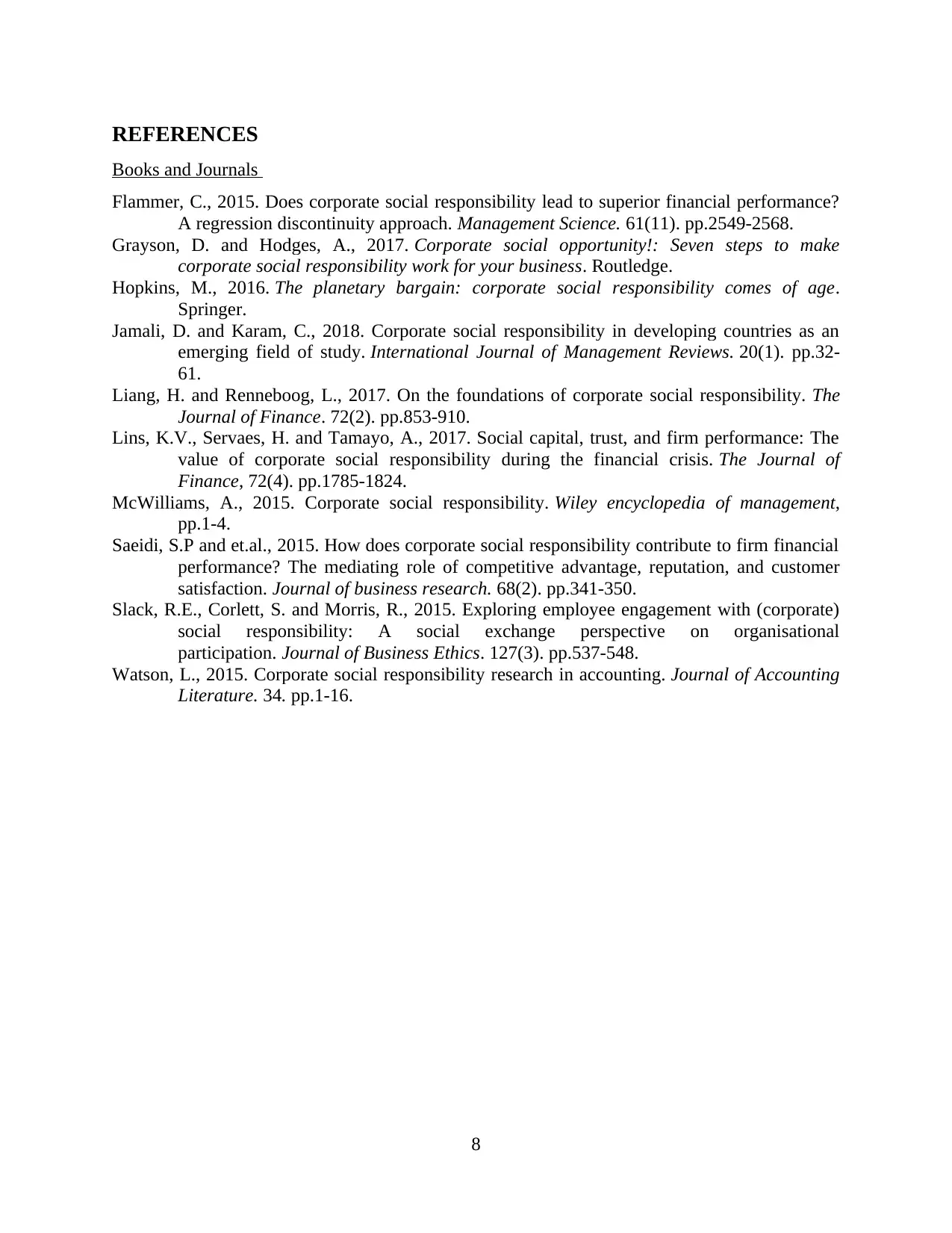
REFERENCES
Books and Journals
Flammer, C., 2015. Does corporate social responsibility lead to superior financial performance?
A regression discontinuity approach. Management Science. 61(11). pp.2549-2568.
Grayson, D. and Hodges, A., 2017. Corporate social opportunity!: Seven steps to make
corporate social responsibility work for your business. Routledge.
Hopkins, M., 2016. The planetary bargain: corporate social responsibility comes of age.
Springer.
Jamali, D. and Karam, C., 2018. Corporate social responsibility in developing countries as an
emerging field of study. International Journal of Management Reviews. 20(1). pp.32-
61.
Liang, H. and Renneboog, L., 2017. On the foundations of corporate social responsibility. The
Journal of Finance. 72(2). pp.853-910.
Lins, K.V., Servaes, H. and Tamayo, A., 2017. Social capital, trust, and firm performance: The
value of corporate social responsibility during the financial crisis. The Journal of
Finance, 72(4). pp.1785-1824.
McWilliams, A., 2015. Corporate social responsibility. Wiley encyclopedia of management,
pp.1-4.
Saeidi, S.P and et.al., 2015. How does corporate social responsibility contribute to firm financial
performance? The mediating role of competitive advantage, reputation, and customer
satisfaction. Journal of business research. 68(2). pp.341-350.
Slack, R.E., Corlett, S. and Morris, R., 2015. Exploring employee engagement with (corporate)
social responsibility: A social exchange perspective on organisational
participation. Journal of Business Ethics. 127(3). pp.537-548.
Watson, L., 2015. Corporate social responsibility research in accounting. Journal of Accounting
Literature. 34. pp.1-16.
8
Books and Journals
Flammer, C., 2015. Does corporate social responsibility lead to superior financial performance?
A regression discontinuity approach. Management Science. 61(11). pp.2549-2568.
Grayson, D. and Hodges, A., 2017. Corporate social opportunity!: Seven steps to make
corporate social responsibility work for your business. Routledge.
Hopkins, M., 2016. The planetary bargain: corporate social responsibility comes of age.
Springer.
Jamali, D. and Karam, C., 2018. Corporate social responsibility in developing countries as an
emerging field of study. International Journal of Management Reviews. 20(1). pp.32-
61.
Liang, H. and Renneboog, L., 2017. On the foundations of corporate social responsibility. The
Journal of Finance. 72(2). pp.853-910.
Lins, K.V., Servaes, H. and Tamayo, A., 2017. Social capital, trust, and firm performance: The
value of corporate social responsibility during the financial crisis. The Journal of
Finance, 72(4). pp.1785-1824.
McWilliams, A., 2015. Corporate social responsibility. Wiley encyclopedia of management,
pp.1-4.
Saeidi, S.P and et.al., 2015. How does corporate social responsibility contribute to firm financial
performance? The mediating role of competitive advantage, reputation, and customer
satisfaction. Journal of business research. 68(2). pp.341-350.
Slack, R.E., Corlett, S. and Morris, R., 2015. Exploring employee engagement with (corporate)
social responsibility: A social exchange perspective on organisational
participation. Journal of Business Ethics. 127(3). pp.537-548.
Watson, L., 2015. Corporate social responsibility research in accounting. Journal of Accounting
Literature. 34. pp.1-16.
8
1 out of 8
Related Documents
Your All-in-One AI-Powered Toolkit for Academic Success.
+13062052269
info@desklib.com
Available 24*7 on WhatsApp / Email
![[object Object]](/_next/static/media/star-bottom.7253800d.svg)
Unlock your academic potential
Copyright © 2020–2025 A2Z Services. All Rights Reserved. Developed and managed by ZUCOL.




